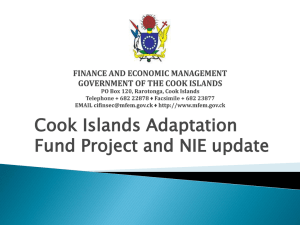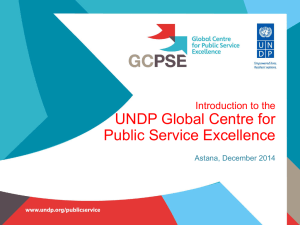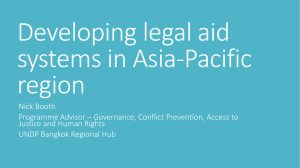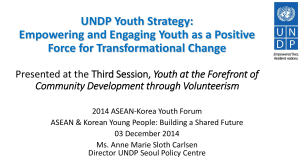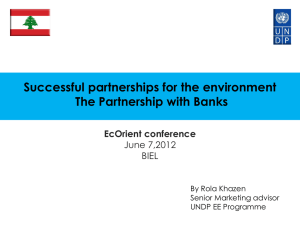Presentation on IC and changes effective July 2012
advertisement
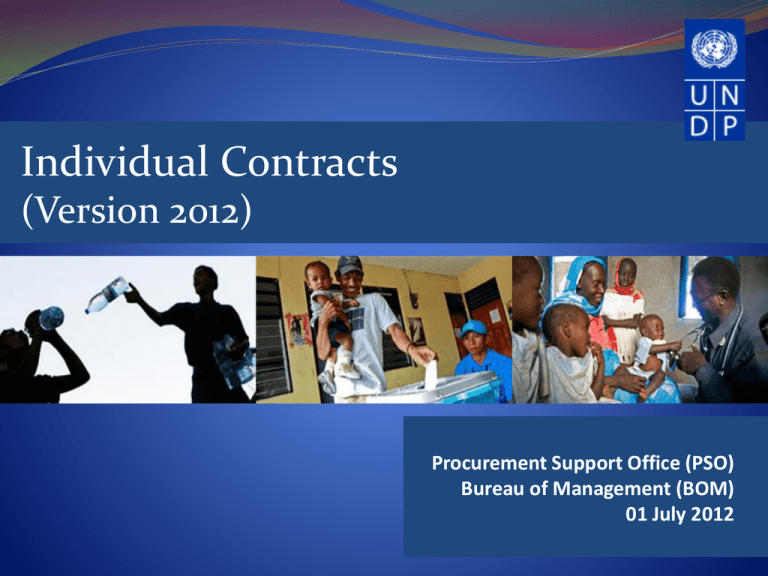
Individual Contracts (Version 2012) Procurement Support Office (PSO) Bureau of Management (BOM) 01 July 2012 CONTENTS • Definition • Background on ICs • Global Statistics of ICs in UNDP • Process Improvements in the Revised IC Policy • Supplemental Guidance on the IC Policy areas considered “Gray” Definitions The Individual Contract is – • UNDP’s modality used for the procurement of services of an INDIVIDUAL to perform NON-STAFF TASKS • Intended solely to deliver CLEAR, QUANTIFIABLE AND TIMEBOUND outputs or services that are DIRECTLY LINKED TO PAYMENTS and defined in a TOR • Used for services that are either : (a) intellectual in nature; or (b) support services in nature. Background on ICs • First IC policy released in December 2010 and made mandatory in April 2011, together with templates and presentation tools • The policy on Individual Contracts (IC) has since been purely under a procurement policy framework, replacing the old SSA which was based on HR policy and instrument • Three (3) series of FAQs were released to aid the implementation process, and along with the rounds of queries directly received by PSO during the last 12 months, were fed into the IC improvement plan and revision strategy Background on ICs A contracting modality for the procurement of time-bound services of an individual, within a predetermined timeframe defined by the Business Unit, and where quantifiable outputs are directly linked to payments Statistics show that UNDP administers an average of 25,000 Individual Contractors since 2006, to whom we have paid an average of US$ 223 Million Every year, nearly 70% of ICs are Male Since 2006, the number of ICs averages 330% the number of UNDP personnel on staff contracts (TA, FTA, PA) Global Statistics at a Glance 7000 6000 HQ 5000 RBAS 4000 RBAP 3000 RBLAC 2000 RBA 1000 RBEC 0 2005 2006 2007 2008 2009 2010 2011 Global Statistics Number of Individual Consultants Paid Per Year (Not based on number of POs/Vouchers but on number of individuals). 2005 2006 2007 2008 2009 2010 2011 2012 HQ RBAS RBAP RBLAC RBA RBEC Others 741 2,264 3,613 5,172 4,962 5,407 1,334 561 884 1,981 2,010 2,892 3,371 662 TOTAL 22,752 25,210 25,784 24,434 24,186 23,940 21,697 11,800 865 2,449 4,237 5,687 5,268 5,975 1,594 874 2,313 4,062 5,640 5,750 6,919 1,100 938 2,211 4,263 4,554 5,411 6,887 1,108 929 1,912 4,517 4,169 6,160 6,358 1,070 997 1,803 4,329 3,917 6,158 6,541 1,192 1,003 1,596 3,798 3,489 5,629 6,013 1,172 Notes on this Presentation • The following slides contain the changes on the IC policy which are now incorporated in the new version • They are not to be understood as the only contents of the IC policy • This presentation assumes that the audience are knowledgeable on the 2011 version of the IC policy PROCESS IMPROVEMENTS 1. Development of New Tools/Templates a) Guide to Requesting Units on How to Write a TOR for IC b) c) d) e) f) g) h) assignments with all the required information Letter for Inviting Individuals to Submit an Offer Offeror’s Covering Letter – confirming interest and submission of financial offer Breakdown of All-Inclusive Price Tables for Shortlisting and Final Rating of Offerors Reference Check for Shortlisted Offerors Justification for the Direct Contracting of ICs Below $100,000 Step by Step by in Accessing UN DSS Basic and Advanced Security Training by non-staff PROCESS IMPROVEMENTS 2. Alignment of threshold with the micro-purchasing policy : All references to US$ 2,500 have been modified to US$ 5,000.00 Amount in USD Less than $5,000 $5,000 – 100,000 Above 100,000 Sourcing No competitive process necessary, past performance review and note to file At least 3 qualified Offerors to be considered. (Advertisement optional) International Advertisement mandatory Receipt of offers incldg. financial Yes, even if only 1 Offeror Yes Yes Evaluation Reference Checks Review of Award Review against the established criteria and note to file To be determined by the Business Unit, depends on the nature of the assignment Evaluation team prepares and signs the note to file for the Procurement Authority’s approval Yes Procurement Authority’s approval Desk review and/ or interview (optional) Interview mandatory Yes RACP or ACP approval based on DPA for Management of ICs (See Section 2.4.2) PROCESS IMPROVEMENTS 3. Additional situation considered as “correct” use of IC “As an exceptional temporary stop-gap capacity support measure intended to assist a staff who has been designated to take on additional functions as a result of the temporary absence of another staff who goes on any form of leave, but such use of IC shall be limited only to a maximum of three (3) months and the work must be without fiduciary duties or other responsibilities intended to be performed only by individuals on staff status”. PROCESS IMPROVEMENTS 4. Introduction of DPA for the Management of ICs for BU’s with DPAs higher than USD 100,000 Bands Overall Delegated Procurement Authority of the BU (in USD) Delegated Procurement Authority for Management of ICs, in Excess of Which, the Case Must be Reviewed by RACP (in USD) Band 1 Band 2 Band 3 Band 4 100,000 300,000 500,000 1 Million 100,000 150,000 250,000 250,000 For BUs in Bands 2, 3 and 4, regardless of the procurement method used (competitive or direct contracting), a CAP review is required each time an IC, or a series of ICs, is expected to reach a total cumulative value of USD 100,000, in lieu of the RACP review. PROCESS IMPROVEMENTS 5. Possibility of obtaining a one-time approval of daily fees in excess of $1,000 In markets where a daily fee exceeding USD 1,000 is prevalent, which therefore leads to frequent requests for approval from the Regional Bureau Director, the BU in such operating environment reserves the option to establish a Table of Consulting Fees for experts of various levels of qualifications, based on a structured market survey conducted by external experts or institutions, which takes into consideration the prevailing daily fee rates used by all other UN Agencies and international organizations of comparable size and mandate as the UN in the same market environment, region or other geographical scope. PROCESS IMPROVEMENTS 6. Allowing Delegation of Bureau Director to Desk Officers for the approval of Consultancy Duration The Regional Bureau Director may delegate the approval of Consultancy Duration (beyond 12 months) or Daily Fee (in excess of US$ 1,000) to the Desk Officer duly assigned to perform oversight on the Country Office where the request originated. Consistent with UNDP’s Internal Control Framework, the said delegation shall be formally made in writing and kept on file of the Regional Bureau. PROCESS IMPROVEMENTS 7. Defining circumstances where the Regional Bureau approval may be waived for ICs exceeding the twelve (12) months cumulative duration “when all of the following conditions are all met : a) The TORs are substantially different from the TORs of previous ICs within the twelve (12) month period; b) The assignment is for a different project; c) A competitive selection processes relevant to the contract amount involved has been undertaken in accordance with this policy as basis for awarding the IC; d) The evaluation team members reviewing the proposals are not the same as those who reviewed the previous IC; and e) The performance of the IC on previous engagement/s was satisfactory.” PROCESS IMPROVEMENTS 7. Defining circumstances where the Regional Bureau approval may be waived for ICs exceeding the twelve (12) months cumulative duration • “If the IC is being issued for a period exceeding twelve (12) months, but the actual days of engagement to be paid will be less than two hundred sixty one (261) actual person-days, and the said periods of actual intermittent engagements are clearly reflected and rationalized in the TOR; and • The IC issued is intended for an on-call intermittent engagement (i.e., fixed hourly or daily fee or other indicators of unit price, and the engagement is on recurrent/oncall basis) over a defined period of time. This refers to an IC that is used as a Framework Agreement or an LTA, and is further explained in Section 6.2 of this Policy.” PROCESS IMPROVEMENTS 8. Changes in the duration of the break in service of former staff “Former or retired staff members may be engaged on an IC provided there has been a minimum break of : a) None, if the previous contract is a Temporary Appointment; b) One (1) month after the official date of separation from the United Nations, if the nature of the separation is not due to retirement, and provided that he/she was not separated on grounds of disciplinary action or unsatisfactory performance; and c) Three (3) months after the official date of retirement from the United Nations, provided he/she is certified medically fit to work.” PROCESS IMPROVEMENTS 9. Changes in the duration of the break in service of former staff “However, all of the above is further subject to the following conditions: a) they are not applying for the position they retired or separated from; b) they are not applying for an assignment which he/she provided oversight while he/she was under a staff contract; c) they are not applying for an assignment whose Terms of Reference they wrote or they were involved in writing; and d) they did not separate from UNDP or another organization of the UN system ….”[disciplinary actions] PROCESS IMPROVEMENTS 10. Exemption of specific Government employees on the requirement to be on a leave-without-pay status “when the individual is employed under a Government entity that allows its employees to receive external short-term consultancy assignments without going “on-leave-without-pay”, the individual entering into an IC with UNDP must still provide a “No-objection” letter from the Government employing him/her. However, the said ‘no-objection’ letter must also state that the employer formally certifies that their employees are allowed to receive short-term consultancy assignment from another entity without being on “leave-without-pay” status, and include any conditions and restrictions on granting such permission, if any.” SUPPLEMENTAL GUIDANCE ON CURRENT POLICY SUPPLEMENTAL GUIDANCE ON CURRENT POLICY 1. Consistency of Terminology – all references to “candidates” and “applicants” have been replaced by “offerors” 2. Section on Definition of Terms – for purposes of common understanding and interpretation 3. Supplemental Guidance Boxes – additional information and illustrations to aid interpretation of the policy 4. Introduction of Situations of Conflict of Interest – consistent with the circumstances of conflict cited in the POPP 5. Clear prohibition on the Engagement of UN/UNDP staff on SLWOP – based on the policy of “no dual contracting” SUPPLEMENTAL GUIDANCE ON CURRENT POLICY Guidance on the following issues : 6. Computing Cumulative Contract Amounts 7. The use and management of ICs based on Daily Fees 8. Solicitation of offers from various sources, including those expecting to sign an RLA 9. Composition of IC Evaluation Team 10. Manner conducting Reference Checks 11. Introduction of the Information Disclosure Provision – publication of earnings above $100,000 SUPPLEMENTAL GUIDANCE ON CURRENT POLICY 12. Guide in determining if the IC is the appropriate modality for an assignment Areas of Consideration General Nature of Work Expected Outputs/ Deliverables Duration of Work Location of Work Circumstances where IC may be an appropriate contract modality The work cannot be sourced within the internal capacity of UNDP. The TOR and/or job title does not resemble any of those in the Generic TORs. The outputs are quantifiable – they can be identified and measured. The need for this output is one-time and definitive – once it is delivered/completed, there is no further need for more such work in the short term period . The time to complete the task is definitive – at a certain period/date, it is not needed anymore. The need for the task is not expected to continue / there is a clearly foreseen end of need for it. The work can be done/completed outside the office / few visits in the office for coordination is needed but not required daily Circumstances where IC is not the best modality / Other contract modalities must be considered The work is a regular staff function. The TOR and/or job title resembles any one of those in the Generic TORs of UNDP staff. It is difficult to quantify or identify the outputs because the tasks / need to perform the tasks is a going concern or must be performed on a continuous basis. The work is expected to be completed within a year (use TA) or beyond a 1-year period (use FTA or SC). The need for the task is expected/likely to continue / no foreseen end of need at short term period (i.e., next 12 months). The person performing the task must be present everyday in the office, and cannot be done outside the office premises. SUPPLEMENTAL GUIDANCE ON CURRENT POLICY 13. Submission of Financial Proposal Regardless of the sourcing method used in generating offers, it is important to observe the following : • All documents required (Letter to UNDP Confirming Interest and Availability, Proposal, CV or P11 and Financial Proposal) shall be presented altogether in just one (1) envelope, if submitted by courier, or in one email transmission, or as an attachment to an on-line application, without password encryption. There is no need for segregation. • If the BU prefers to segregate the Financial Proposal with the rest of the documents required, the BU shall implement the appropriate mechanism for such segregation, but shall enforce the separation of the envelopes only for ICs with contract values exceeding USD 100,000.00. SUPPLEMENTAL GUIDANCE ON CURRENT POLICY 14. Clarification “national” and “international” fees Regardless of the nationality or citizenship the determination of rates and currency of the payment shall be based on the following guidance : • When TORs do not require global knowledge or internationally-acquired experience and expertise, and when the skills needed for the work or assignment are readily available in the local market, regardless of his/her personal experience, country of residence, or designations under past contracts, the individual contractor’s fee may be expressed in local currency and must be based on standard/prevailing rates in the local market. • When the TOR for the work or assignment requires global expertise and/or internationally-acquired years of experience, and when the individual is required to have skills and abilities obtained through a successful international track record in order to qualify for the assignment, international consulting rates and currency may be used. SUPPLEMENTAL GUIDANCE ON CURRENT POLICY 15. Evaluation Report The outcome of the entire process ( from shortlisting to interview) shall be presented in a single report, duly signed by the evaluation team, incorporating the following : • • • • The ratings of each offeror (technical and financial); The strengths and weaknesses of each offeror; The interview/desk review findings; Any decision arising from the acceptance or non-acceptance of a negative reference check feedback; and • The best offeror selected and recommended for contracting. SUPPLEMENTAL GUIDANCE ON CURRENT POLICY 16. Guidance for engaging individuals who have current ICs in another BU • Communicate with the Business Unit that issued the currently active IC; • Reconcile the timelines of the new IC to be issued with that of the active IC from another Business Unit, steering clear of all possibilities of conflicts; • Disclose to, and discuss with, the Business unit that issued the current IC the intent to issue a new IC and discuss a mutually agreeable arrangement, taking shared responsibility for possible consequences; • Communicate to the Individual Contractor the agreed arrangement between the UNDP Business Units; and • Obtain a written statement from the Individual Contractor, addressed to both Business Units, that neither of the two (2) ICs will be compromised in terms of quality and timeliness of completion of deliverable and outputs. SUPPLEMENTAL GUIDANCE ON CURRENT POLICY 17. Clarity on the need for Statement of Fitness to Work from a UN approved doctor Individual Contractors whose assignments require travel and who are over 62 years of age are required, at their own expense, to undergo a full medical examination, including x-rays, as well as obtaining medical clearance from an UN-approved doctor prior to taking up their assignment. However, this does not apply to individuals engaged through an RLA. Where there is no UN office present in the location of the Individual Contractor expected to undertake the travel, either for repatriation or duty travel, the Individual Contractor may choose his/her own preferred physician to obtain the required medical clearance. The medical clearance shall be kept in UNDP records and remain valid for a period of twelve (12) months. SUPPLEMENTAL GUIDANCE ON CURRENT POLICY 18. Guidance on the inclusion of ICs in a BU’s Security Plan • All evacuation procedures applied to any UN staff shall be extended to Individual Contractors. However, the Individual Contractor shall be advised that no dependent/s accompanying Individual Contractors to the duty stations are to be included in such procedures. • Political or security evacuation must be distinguished from medical evacuation, the cost of which shall be borne either by the Individual Contractor or his/her own insurance carrier. • Should the Individual require his/her own personal security services as a measure to minimize security risks, or as may be necessary in a given duty station on Security Level, such costs shall be borne fully by the individual SUPPLEMENTAL GUIDANCE ON CURRENT POLICY 18. Guidance on the inclusion of ICs in a BU’s Security Plan • Must be included in UN/UNDP security plan and arrangements that are in effect at any duty station, except when the IC is on an intermittent/on-call basis, who are paid by the hour/day, or who are working from home (i.e, without need to leave their residence). • However, when they are on duty during any security-related incidents, they must be included in any physical measures that the UNDP Business Unit may undertake to mitigate security risks related to all personnel under UN contracts. • For ICs working from home while on an IC, the physical security measures will not apply to his/her home, but he/she shall be included in all UNDP security information dissemination, briefings, trainings, communications, etc. SUPPLEMENTAL GUIDANCE ON CURRENT POLICY 19. Conditions for the issuance of Business Cards The granting of UNDP business cards to ICs is strongly discouraged. Where the nature of the work necessitates that the Individual Contractor be given business cards, the following requirements must be met : • A justification for the issuance of the business card has been established in writing and has been duly approved by the Head of the Business Unit; • While the business card may mention the title of the UNDP Project for which the Individual Contractor is delivering the outputs, the business card that will be issued shall not bear the logo of the UN or UNDP; and • The designation of the Individual Contractor must not resemble the nomenclature for any UNDP staff functions, and must be indicative of the temporary nature of the assignment (e.g., Consultant, etc.) SUPPLEMENTAL GUIDANCE ON CURRENT POLICY 20. Conditions for the creation of email accounts When required by the assignment or the kind of services to be performed, Individual Contractors may be given a UNDP e-mail address. The relevant UNDP staff supervisor can also request UNDP Intranet access, as needed. However, the BU shall be responsible for monitoring and ensuring that the said email accounts are disabled upon completion of the IC services SUPPLEMENTAL GUIDANCE ON CURRENT POLICY 21. Guidance on the use of rosters based on IC thresholds • Below USD 5,000 : a BU may source any one (1) or more qualified Offeror/s that may be directly contracted, if direct contracting is preferred; • Above USD 5,000 but below USD 100,000 : a BU may source at least three (3) qualified Offerors that may be directly invited to submit a proposal specific to the nature of the assignment/TOR, and subject all such Offerors to further evaluation; • Over USD 100,000: At this amount, advertisement of Procurement Notice is mandatory. If there are qualified individuals in the roster, they shall be directly notified of the advertised IC assignment, and directly compete with other respondents to the advertisement, SUPPLEMENTAL GUIDANCE ON CURRENT POLICY 21. Guidance on the use of rosters based on IC thresholds All types of roster must meet the following minimum requirements : • All entries to a roster must be subject to a screening and evaluation of qualifications by at least two (2) UNDP staff members; • All entries shall be subject to verification with all UN/UNDP list of individuals or entities ineligible to obtain any contract from the UN/UNDP; and • Individuals in the roster whose performance has been found to be unsatisfactory based on previous ICs should be removed from the roster. SUPPLEMENTAL GUIDANCE ON CURRENT POLICY 22. Guidance on Pre-Approved Rosters • • Pre-approved are rosters names can be directly sourced for assignments valued at less than USD 100,000, without need for further competition by desk review. Allowed only upon approval from the RACP based on ex-ante submission which provides at least the following information: The method to be used for sourcing the individual entries; The level of details about the individual in the roster; The process of screening and pre-approving each individual entry; The procedure for updating, adding and deleting individual entries; The justification on why such a pre-approved roster is necessary (i.e., to what extent can it improve efficiency, based on demand for BU’s demand for ICs). SUPPLEMENTAL GUIDANCE ON CURRENT POLICY 22. Guidance on Pre-Approved Rosters Consistent with the provisions stated in Section 6.2 above (IC as Framework Agreement), any RACP or ACP approval on such roster is only valid for three (3) years. Thereafter, the BU shall re-submit the case, indicating any further changes arising from lessons learned. The thresholds for daily fees, cumulative contract amounts and duration limits, shall also apply on all ICs generated from a preapproved roster. SUPPLEMENTAL GUIDANCE ON CURRENT POLICY 23. Clarity on the use of IC as LTA / Deletion of the term “retention” “TOR must clearly specify the following minimum conditions: • The unit price for the service (e.g., fee per hour, fee per day, fee per page, etc.); • The process for activating or initiating the rendering of service within the period of the IC (e.g., issuance of PO, etc.). All ICs used as LTA must indicate a ceiling price limiting the cumulative amounts that will accrue to the individual during the life of the IC/LTA. For ICs that are arranged as LTAs, the IC thresholds for daily fees, and the thresholds for cumulative amounts relevant to LTAs, shall continue to apply.” SUPPLEMENTAL GUIDANCE ON CURRENT POLICY 23. Clarity on the use of IC as LTA / Deletion of the term “retention” Note : BUs must refrain from ICs as LTAs must : using the term “retainer” when • Be priced per unit; referring to an • Indicate a trigger for call-off (e.g., use of PO) individual engaged on • indicate a ceiling price limiting the cumulative amounts an IC or RLA. The legal definition of a that will accrue to the individual during the life of the “retainer” IC/LTA, arrangement is that • Be monitored for cumulative contract amounts the entity requiring the encumbered for the duration of the IC/LTA; and services pays in • Be submitted to the proper committee as the cumulative advance for the work payments within the life of the IC reaches the thresholds that will be specified and defined at a later specified in this policy. date. SUPPLEMENTAL GUIDANCE ON CURRENT POLICY 24. Clarification on the use of RLAs • an instrument used to engage individuals that are employed with another legal entity, at the time of their engagement with UNDP • subject to the same procurement processes, procedures and thresholds as set forth in the IC policy • It must be the individual who will decide if the contract should be IC or RLA, not UNDP • Under an RLA, the signatory organization/institution makes available to UNDP he services of the selected Individual for a given period. • The organization/ institution therefore remains responsible for the direct payment of actual cost of salaries, taxes, insurances and other entitlements/emoluments due to the individual and UNDP merely reimburses the organization/institution SUPPLEMENTAL GUIDANCE ON CURRENT POLICY 24. Clarification on the use of RLAs • If the organization/company/institution signing the RLA so requires, UNDP may pay a fixed management fee or administrative charges, provided that such costs were incorporated in the financial proposal of the individual who submitted an offer to UNDP. • Only individuals must submit an offer – not their employers, even if an RLA is anticipated by the individual. This is because the focus of the selection process must remain to be the individual, since it is the IC policy that applies to RLAs. • UNDP reserves the right to refuse the issuance or signature of the RLA with the employer of the selected Offeror when the name of the said employer is in the list of entities ineligible to obtain contracts from the UN/UNDP. SUPPLEMENTAL GUIDANCE ON CURRENT POLICY 25. Cost recovery for the insurance coverage and reiteration of the mandatory identification of the IC’s beneficiary This insurance for Individual Contractors is centrally administered by PSO/BOM in UNDP HQ, but the cost thereof shall be recovered from the Business Unit administering the IC. For purposes of processing claims, it is important that every IC signed by UNDP shall bear the name of a beneficiary nominated by the Individual Contractor. Every UNDP Business Unit issuing an IC must ensure that this requirement is strictly followed. If you have any more questions after the workshop, go to: Procurement Helpline https://intranet.undp.org/unit/bom/pso/helpline%20and%20mpn%20procu rement/default.aspx ethel.capuno@undp.org


